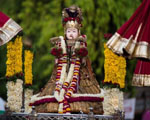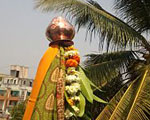|
Festival News |
 |
|
Gangaur
Festival (30th
March, 2017) |
| |
|
| |
Gangaur
festival of
Rajasthan is
celebrated
in reverence
to Lord
Shiva and
goddess
Parvati. It
derives its
name from
the words 'Gan'
and 'Gauri',
the former
is another
name for
Shiv while
the latter
is used to
address
Parvati. The
festival
centres
around women
and all the
rituals to
be followed
are observed
by them. The
festival is
held in the
month of 'Chaitra'
as per the
Hindu
calendar.
The festival
rituals
commence the
day after
Holi.
The festival
celebrates
the union of
Shiva and
Parvati
which gives
young girls
and boys an
occasion to
interact
with each
other. It is
an elaborate
occasion and
there are
several
rituals
associated
with it.
These
rituals
include:
-
Collecting
ash from
Holika
Dehan
and
burying
seeds of
wheat
and
barley
in it
and
protecting
them by
watering
till the
seeds
germinate.
-
Songs in
praise
of Shiv
and
Parvati
are sung
by women
who also
carry
pots on
their
heads.
ē Women
make
clay
images
of both
Shiva
and
Parvati.
-
A
procession
is taken
by young
girls
and all
of them
place an
earthern
pot with
holes
and lamp
inside
on their
heads.
They
distribute
cash and
other
gifts on
their
way.
-
The
final
day of
the
festival
sees
images
of Gauri
being
taken
out in a
procession
accompanied
by
camels,
bullock
carts,
horses
and
elephants.
The
procession
is
symbolic
of
return
of Gauri
to her
husband's
(Shiv's)
home.
-
To mark
the end
of the
procession,
the
girls
break
their
pots.
Apart from
these
rituals,
newly
married
women fast
for the
whole
eighteen
days of the
festival and
even
unmarried
women fast
and eat only
one meal a
day in the
hope to find
a good
husband.
During this
festival in
Jaipur, a
popular
sweet dish
called 'Ghewar'
is
distributed
between
families,
relatives
and friends. |
|
 |
|
Gudi Padwa
(28th March,
2017) |
| |
|
| |
This
celebrated
as the first
day of the
year by
Maharashtrians
and Konkanis.
On this day,
new
Samvatsara,
which is
cycle of
sixty years,
starts. All
sixty
Samvatsara
are
identified
by unique
name.
Gudi Padwa
is
celebrated
as Ugadi by
the people
of Karnataka
and Andhra
Pradesh.
Both Gudi
Padwa and
Ugadi are
celebrated
on the same
day.
Gudi Padwa
is Marathi
New Year
according to
Luni-Solar
calendar.
Luni-Solar
calendars
consider the
position of
the Moon and
the position
of the Sun
to divide
the year
into months
and days.
The
counter-part
of Luni-Solar
calendar is
Solar
calendar
which
considers
only
position of
the Sun to
divide the
year into
months and
days.
Because of
that Hindu
New Year is
celebrated
twice in the
year with
different
names and at
two
different
times of the
year. The
Hindu New
Year based
on Solar
calendar is
known as
Puthandu in
Tamil Nadu,
Bihu in
Assam,
Vaisakhi in
Punjab, Pana
Sankranti in
Orissa and
Naba Barsha
in West
Bengal.
The day
begins with
ritual
oil-bath
followed by
prayers. Oil
bath and
eating Neem
leaves are
must rituals
suggested by
scriptures.
North
Indians
donít
celebrate
Gudi Padwa
but start
nine days
Chaitra
Navratri
Puja on the
same day and
also eat
Neem with
Mishri on
the very
first day of
Navratri. |
|
|
|